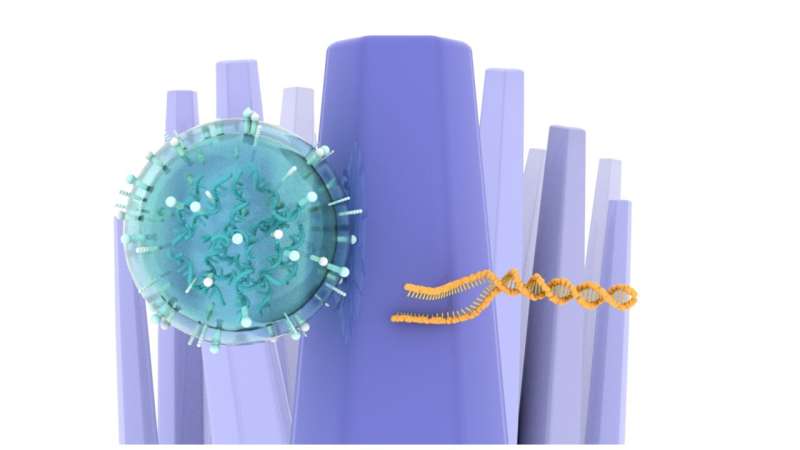
A group led by researchers at Nagoya University in Japan has developed a technology to capture and release cell-free DNA (cfDNA) on nanowire surfaces from urine. By extracting this DNA, they were able to successfully detect IDH1 mutation, a characteristic genetic mutation of gliomas, a type of brain tumor. Their findings increase the effectiveness of cancer detection tests using urine. They published their results in the journal Biosensors and Bioelectronics.
Brain tumors are often examined only after the appearance of symptoms, such as paralysis of the limbs. But even when they are detected, they are often so advanced that it is difficult to remove them by surgery. Among these tumors, some of the deadliest are gliomas. These tumors have an average survival time as low as 12-18 months. Therefore, for the patient to have a chance of survival, early detection is necessary.
As many patients have routine physicals in which they give urine samples, these samples could be effectively used to look for evidence of brain tumors. One characteristic of brain tumors is the presence of cfDNA, which are small DNA particles released as the tumor rejuvenates its cells and disposes of old damaged ones. Usually, the host’s cfDNA is cleared up by macrophages, but in the case of cancer cells, the cells divide so quickly that there is excess leftover cfDNA, which is excreted in the urine.
“The detection of these cells as a non-invasive way to check for cancer has been approved by the U.S. Food and Drug Administration for cancer screening, diagnosis, prognosis, and monitoring of cancer progression and treatment response,” Professor Takao Yasui, a member of the research group, said. “However, a major bottleneck is the lack of techniques to isolate cfDNA efficiently from urine, as the excreted cfDNA may be short, fragmented, and low concentration.”
To overcome this problem, a team consisting of Professor Takao Yasui, Professor Yoshinobu Baba, and Researcher Hiromi Takahashi from the Graduate School of Engineering, along with Professor Atsushi Natsume from the Institutes of Innovation for Future Society, Nagoya University, in collaboration with Professor Takeshi Yanagida from the University of Tokyo, and Associate Professor Sakon Rahong from King Mongkut’s Institute of Technology Ladkrabang, Thailand, used a catch-and-release method on zinc oxide (ZnO) nanowire surfaces to capture cfDNA and extracellular vesicles from gliomas.
ZnO was chosen because water molecules adsorb on the surface of ZnO nanowires. These water molecules then form hydrogen bonds with any cfDNA in the urine sample. The bonded cfDNA can then be washed out, allowing researchers to isolate trace amounts of it in a sample.
Their technique was a resounding success. “We succeeded in isolating urinary cfDNA, which was exceptionally difficult with conventional methods,” Yasui said. “Although in a previous experiment, we showed that our nanowire could capture cancer extracellular vesicles, which we found in this sample too; the surprising thing was the capture of cfDNA using a similar technique. When we extracted the cfDNA, we detected the IDH1 mutation, which is a characteristic genetic mutation found in gliomas. This was exciting for us, as this is the first report of the detection of the IDH1 mutation from a urine sample as small as 0.5 ml.”
“This research overcomes the shortcomings of currently used methods by using chemical, biological, medical and nanotechnological techniques to provide a state-of-the-art method for the clinical use of urinary cfDNA, especially as an analytical tool to facilitate the early diagnosis of cancer,” Yasui said. “Although we tested gliomas, this method opens new possibilities for the detection of tumor mutations. If we know the type of mutation to look for, we can easily apply our technique to detect other types of tumors, especially the detection of those that cannot be isolated by conventional methods.”
More information:
Hiromi Takahashi et al, Mutation detection of urinary cell-free DNA via catch-and-release isolation on nanowires for liquid biopsy, Biosensors and Bioelectronics (2023). DOI: 10.1016/j.bios.2023.115318
Provided by
Nagoya University
Citation:
Urine tests identify brain tumors by capturing cancer DNA using nanowires (2023, July 3)
retrieved 3 July 2023
from https://phys.org/news/2023-07-urine-brain-tumors-capturing-cancer.html
This document is subject to copyright. Apart from any fair dealing for the purpose of private study or research, no
part may be reproduced without the written permission. The content is provided for information purposes only.








